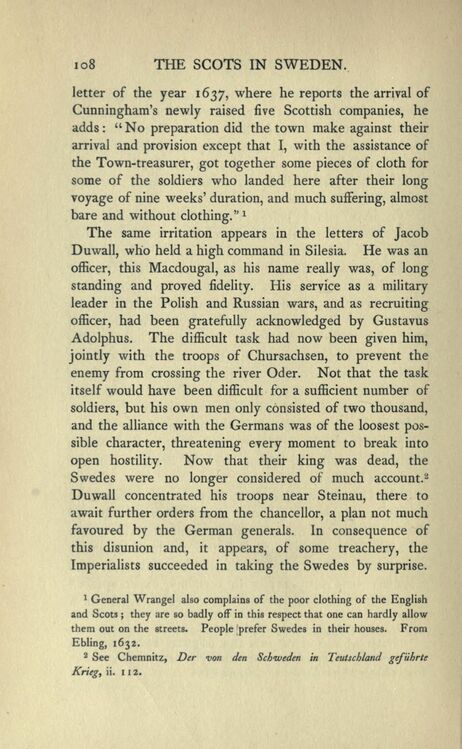
Full resolution (JPEG) - On this page / på denna sida - Sidor ...

<< prev. page << föreg. sida << >> nästa sida >> next page >>
Below is the raw OCR text
from the above scanned image.
Do you see an error? Proofread the page now!
Här nedan syns maskintolkade texten från faksimilbilden ovan.
Ser du något fel? Korrekturläs sidan nu!
This page has never been proofread. / Denna sida har aldrig korrekturlästs.
letter of the year 1637, where he reports the arrival of
Cunningham’s newly raised five Scottish companies, he
adds: “No preparation did the town make against their
arrival and provision except that I, with the assistance of
the Town-treasurer, got together some pieces of cloth for
some of the soldiers who landed here after their long
voyage of nine weeks’ duration, and much suffering, almost
bare and without clothing.”1
The same irritation appears in the letters of Jacob
Duwall, who held a high command in Silesia. He was an
officer, this Macdougal, as his name really was, of long
standing and proved fidelity. His service as a military
leader in the Polish and Russian wars, and as recruiting
officer, had been gratefully acknowledged by Gustavus
Adolphus. The difficult task had now been given him,
jointly with the troops of Chursachsen, to prevent the
enemy from crossing the river Oder. Not that the task
itself would have been difficult for a sufficient number of
soldiers, but his own men only consisted of two thousand,
and the alliance with the Germans was of the loosest
possible character, threatening every moment to break into
open hostility. Now that their king was dead, the
Swedes were no longer considered of much account.1 2
Duwall concentrated his troops near Steinau, there to
await further orders from the chancellor, a plan not much
favoured by the German generals. In consequence of
this disunion and, it appears, of some treachery, the
Imperialists succeeded in taking the Swedes by surprise.
1 General Wrangel also complains of the poor clothing of the English
and Scots ; they are so badly off in this respect that one can hardly allow
them out on the streets. People prefer Swedes in their houses. From
Ebling, 1632.
2 See Chemnitz, Der von den Schweden in Teutschland gefiihrte
Kriegy ii. 112.
<< prev. page << föreg. sida << >> nästa sida >> next page >>